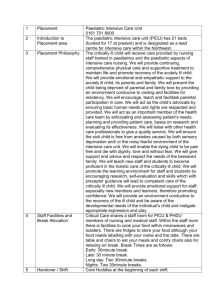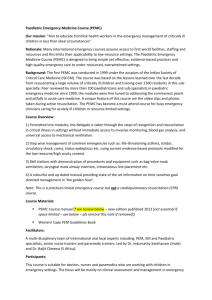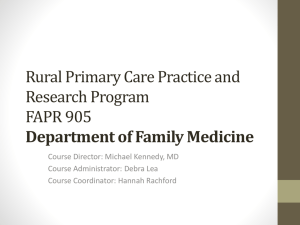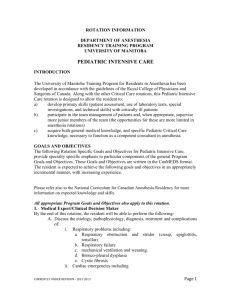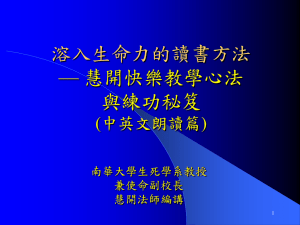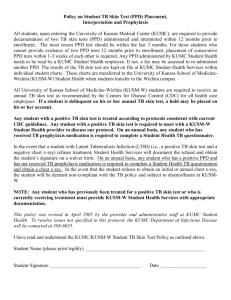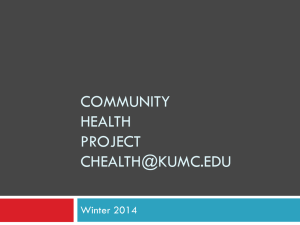CRITICAL CARE SELECTIVE - University of Kansas Medical Center
advertisement
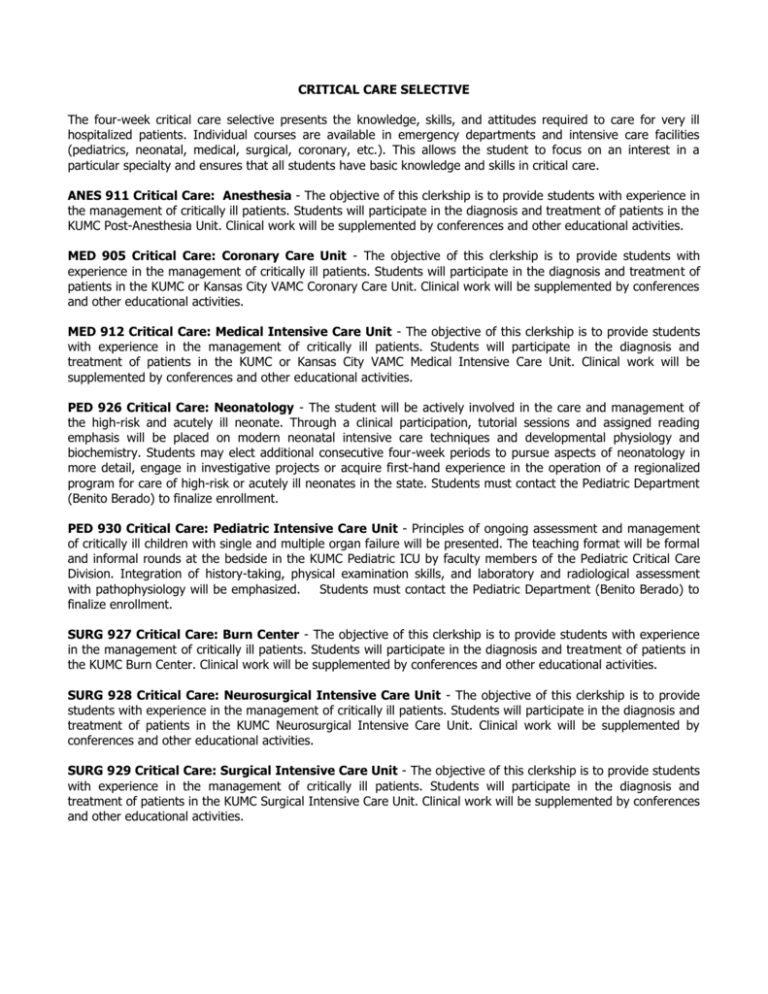
CRITICAL CARE SELECTIVE The four-week critical care selective presents the knowledge, skills, and attitudes required to care for very ill hospitalized patients. Individual courses are available in emergency departments and intensive care facilities (pediatrics, neonatal, medical, surgical, coronary, etc.). This allows the student to focus on an interest in a particular specialty and ensures that all students have basic knowledge and skills in critical care. ANES 911 Critical Care: Anesthesia - The objective of this clerkship is to provide students with experience in the management of critically ill patients. Students will participate in the diagnosis and treatment of patients in the KUMC Post-Anesthesia Unit. Clinical work will be supplemented by conferences and other educational activities. MED 905 Critical Care: Coronary Care Unit - The objective of this clerkship is to provide students with experience in the management of critically ill patients. Students will participate in the diagnosis and treatment of patients in the KUMC or Kansas City VAMC Coronary Care Unit. Clinical work will be supplemented by conferences and other educational activities. MED 912 Critical Care: Medical Intensive Care Unit - The objective of this clerkship is to provide students with experience in the management of critically ill patients. Students will participate in the diagnosis and treatment of patients in the KUMC or Kansas City VAMC Medical Intensive Care Unit. Clinical work will be supplemented by conferences and other educational activities. PED 926 Critical Care: Neonatology - The student will be actively involved in the care and management of the high-risk and acutely ill neonate. Through a clinical participation, tutorial sessions and assigned reading emphasis will be placed on modern neonatal intensive care techniques and developmental physiology and biochemistry. Students may elect additional consecutive four-week periods to pursue aspects of neonatology in more detail, engage in investigative projects or acquire first-hand experience in the operation of a regionalized program for care of high-risk or acutely ill neonates in the state. Students must contact the Pediatric Department (Benito Berado) to finalize enrollment. PED 930 Critical Care: Pediatric Intensive Care Unit - Principles of ongoing assessment and management of critically ill children with single and multiple organ failure will be presented. The teaching format will be formal and informal rounds at the bedside in the KUMC Pediatric ICU by faculty members of the Pediatric Critical Care Division. Integration of history-taking, physical examination skills, and laboratory and radiological assessment with pathophysiology will be emphasized. Students must contact the Pediatric Department (Benito Berado) to finalize enrollment. SURG 927 Critical Care: Burn Center - The objective of this clerkship is to provide students with experience in the management of critically ill patients. Students will participate in the diagnosis and treatment of patients in the KUMC Burn Center. Clinical work will be supplemented by conferences and other educational activities. SURG 928 Critical Care: Neurosurgical Intensive Care Unit - The objective of this clerkship is to provide students with experience in the management of critically ill patients. Students will participate in the diagnosis and treatment of patients in the KUMC Neurosurgical Intensive Care Unit. Clinical work will be supplemented by conferences and other educational activities. SURG 929 Critical Care: Surgical Intensive Care Unit - The objective of this clerkship is to provide students with experience in the management of critically ill patients. Students will participate in the diagnosis and treatment of patients in the KUMC Surgical Intensive Care Unit. Clinical work will be supplemented by conferences and other educational activities. Critical Care Director – Matthew Sharpe, M.D. Students are required to participate in weekly didactic sessions: Core Principles of Critical Care Evidenced based medicine in the ICU Acid-base Shock (Early goal directed therapy) Basic mechanical ventilation in the critical care setting) Case-based discussion sessions (topics frequently encountered in the critical care setting). This is also an opportunity for students to ask questions about cases they have been involved in on the wards. Ventilator mechanics Arrythmias in the critical care setting Hemodynamic monitoring Trauma/ Burn Management Acute MI/ Cardiogenic shock Sepsis GI Emergencies (GI bleeds, acute hepatic failure, etc) End of Life Issues Critical Care Selective Course Objectives Recognize and intervene appropriately in common medical and surgical crises: Medical Crises a. Respiratory failure (-hypoxic and –hypercarbic) b. Hemodynamic compromise (-arrhythmias, -shock, -hypovolemic, -loss of vascular resistance (ex: septic), -cardiogenic, -hypertensive crisis c. Electrolyte and acid/base emergencies Neurologic Crises a. Coma, seizure, mental status changes Surgical Crises a. Hemorrhagic shock b. Burn resuscitation Skills acquired during the critical care selective should include: -appropriate determination of patient admission and discharge criteria for ICU level care -acquisition and interpretation of basic laboratory, radiologic and hemodynamic monitoring data required during medical/surgical crises -fundamental familiarity with central and peripheral intravenous access, arterial lines, and SwanGanz catheters -initiate basic airway management and mechanical ventilation modalities
